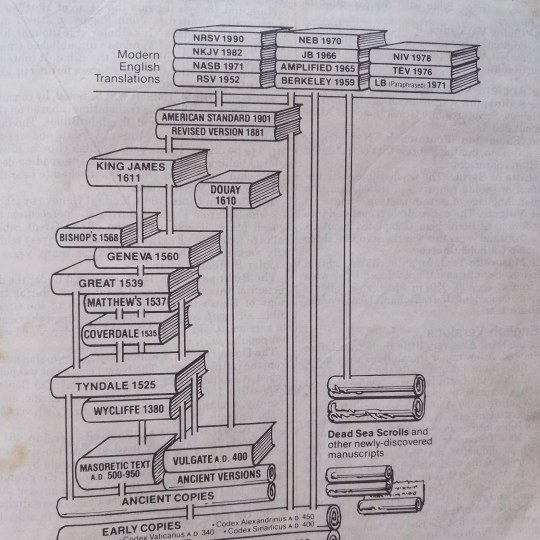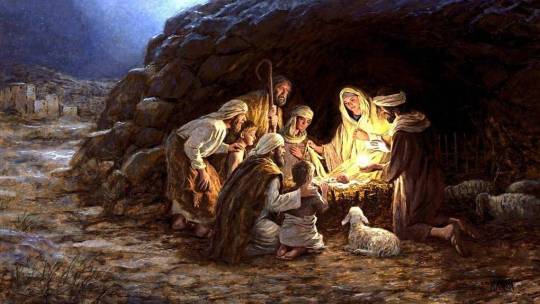#The Cambridge Paragraph Bible of the Authorized English Version
Photo

Seeing the Glory of God
Jesus saith unto her, Said I not unto thee, that, if thou wouldest believe, thou shouldest see the glory of God?
— John 11:40 | The Cambridge Paragraph Bible of the Authorized English Version (CAMB)
The Cambridge Paragraph Bible of the Authorized English Version, by Scrivener, Frederick Henry Ambrose, 1813-1891. Published by Cambridge University Press.
Cross References: Exodus 16:7; Matthew 17:20; Mark 9:23; John 11:4; John 11:23; Romans 6:4
#faith#Jesus#glory of God#John 11:40#Gospel of John#New Testament#The Cambridge Paragraph Bible of the Authorized English Version#CAMB#Cambridge University Press
12 notes
·
View notes
Photo

Now faith is the substance of things hoped for, the evidence of things not seen.
— Hebrews 11:1 | The Cambridge Paragraph Bible of the Authorized English Version (CAMB)
The Cambridge Paragraph Bible of the Authorized English Version, by Scrivener, Frederick Henry Ambrose, 1813-1891. Published by Cambridge University Press.
Cross References: Romans 8:24; 2 Corinthians 4:18; 2 Corinthians 5:7; Hebrews 3:6; Hebrews 3:14; Hebrews 10:39; Hebrews 11:7; Hebrews 11:27
#faith#confidence#hope#assurance#Hebrews 11:1#The Book of Hebrews#The Cambridge Paragraph Bible of the Authorized English Version#New Testament#CAMB#Cambridge University Press
1 note
·
View note
Text

ORIGIN AND GROWTH OF THE ENGLISH BIBLE
TRADITIONAL - Additions to Esther, Susanna, Song of the Three Holy Children, Bel and the Dragon, Judith, and Tobit.
PROPHETIC - Baruch and the Prayer of Manasseh.
APOCALYPTIC - 2 Esdras and 4 Esdras in the Latin Vulgate.
INSTRUCTIVE - Ecclesiasticus and the Wisdom of Solomon (in a style like the Proverbs).
ORIGIN AND GROWTH OF THE ENGLISH BIBLE
The above drawing shows the gradual development of the English Bible as well as the foundations on which each successive version rests.
Since we are living in an age of printing, it is hard for us to realize that when the books of the Bible were originally written, there was no easy or inexpensive way to make copies. Each copy had to be made slowly
and laboriously by hand. It was inevitable that many ancient books would be lost. This largely accounts for the fact that all original manuscripts of the Bible have
perished.
The question arises, What is the literary foundation of the Bible?
(1) - EARLY COPIES
These were possibly made from the original manuscripts. Three principal ones are:
(a) The Codex Sinaiticus, a codex (early bound book) of the Greek Bible, belonging to the fourth century. Purchased from the Soviet Republic of Russia in 1933 by Great Britain and now in the British Museum.
(b) The Codex Alexandrinus, probably written in the fifth century, now in the British Museum. Contains the whole Greek Bible with the exception of forty lost leaves.
(c) The Codex Vaticanus, in the Vatican library at Rome, originally contained the whole Bible but parts are now lost. Written probably about the middle of the fourth century.
(2) - THE ANCIENT VERSIONS AND TEXTS
a) The Septuagint. A translation of the Old Testament Hebrew Scriptures into Greek, made at Alexandria about 250 B.C.
(b) The Samaritan Pentateuch. Not strictly speaking a version, but the Hebrew text perpetuated in Samaritan characters.
(c) Peshitta or Syriac. The whole Bible, date uncertain (first or second century?), a translation into the common language of certain parts of Syria.
(d) The Vulgate. The entire Bible translated into Latin, by Jerome at Bethlehem. Completed about AD 400. For a thousand years this was the standard Bible in the Roman Catholie Church.
(e) The Masoretic Text. An authoritative edition of the Hebrew Scriptures (OT) developed by Jewish scholars from c. AD 500-950, in which vowel points were first introduced into the consonantal (consonants only) Hebrew text.
(3) - EARLY ENGLISH VERSIONS
During the Dark Ages very little Bible translation was attempted. A few minor translations were made of parts of the Bible, but generally the Word of God was locked up in the Latin language, which was unknown to the common people.
JOHN WYCLIFFE (1320-1384), a great English scholar and Bible student, conceived the plan of translating the whole Bible into common English. He first translated the New Testament about 1380. Exactly how much more he did before his death is uncertain. His friends completed the work after his death. From the drawing it can be seen that his work rests primarily on the Latin Vulgate.
WILLIAM TYNDALE was the next of the great English translators. He was an early and courageous reformer and was determined that the English common people should have the Bible in their own language. Because persecution made it impossible for him to do his work in England, he crossed over to the Continent, where his New Testament translation was issued in 1525 and the Pentateuch in 1530.
By referring to the drawing it can be seen that his version does not rest entirely upon the Latin Vulgate. Tyndale was a capable Greek scholar and had access to the Greek text of Erasmus and other helps which
Wycliffe did not possess. He also had a fine command of English, which left its impression on all later versions. Although he was martyred before he completed the Old Testament, it is generally thought that he translated the material which appeared later in the Matthew's Version.
MILES COVERDALE. A friend of Tyndale, he prepared and published a Bible dedicated to Henry VIII in 1535. Coverdale's New Testament is largely based on Tyndale's. He explicitly disclaimed originality, but used
the Latin and other versions, as well as Tyndale's, as helps.
MATTHEW'S BIBLE. 1537. About the same time as the second edition of the Coverdale Bible another translation appeared. Its authorship is somewhat uncertain, but though it bears the name of Matthew it
is generally credited to John Rogers, a friend and companion of Tyndale. This scholar, it is thought, had come into possession of Tyndale's unpublished translation of the historical books of the Bible. It contains Tyndale's translations in their latest forms but also reflects Coverdale's work.
THE GREAT BIBLE. 1539. It will be noted, by consulting the drawing, that this translation is based on the Matthew's, Coverdale, and Tyndale Bibles. The first edition was prepared by Miles Coverdale and was ordered to be displayed in every Enıylish church. It Was a large volume and was chained to the reading desk in the churches, where the people flocked to hear the reading of the Word of God.
THE GENEVA BIBLE. 1560. Made at Geneva by scholars who fled from England during the persecution by Queen Mary, it was a revision of the Great Bible collated with other English translations. A very scholarly version, handy in size, and for many years a popular Bible in England.
THE BISHOPS' BIBLE. 1568. Prepared under the direction of the Archbishop of Canterbury during the reign of Elizabeth. Mainly a revision of the Great Bible, although somewhat dependent upon the Geneva version. It was used ehiefly by the clergy and was not popular with the common people.
THE DOUAY BIBLE. A Roman Catholic version made from the Latin Vulgate. The New Testament was published at Rheims, 1582; the Old Testament at Douay 1609-1610. It contains controversial notes and, until recently, was the generally accepted English version of the Catholic Church.
THE KING JAMES, or Authorized, Version. 1611. The translation generally used by English-speaking people for over three hundred years; made by forty seven scholars under the authorization of King James I of England. The Bishops' Bible was the basis of this version, but the Hebrew and Greek texts were studied and other English translations consulted in order to obtain the best renderings.
THE REVISED VERSION. 1881-1885. Made by a group of English and American scholars. It can be seen by glancing at the drawing that the Revised Version, while it was supposed to be a revision of the Authorized Version, has one distinct advantage over all its predecessors. It reaches down to the most ancient copies of the original Scriptures. Some of these ancient texts were not available at the time of the translation of the Authorized Version.
THE AMERICAN STANDARD VERSION. 1900-1901. This version incorporates into the Revised Version, the renderings preferred by the American members of the Revision Committee of 181-1885.
(4) - ENGLISH VERSIONS SINCE 1901
As shown on the chart, at least ten modern English translations of the Bible have appeared since 1901. The twentieth century has seen numerous archaeological discoveries in the Holy Land, as well as the discovery in 1947 of the Dead Sea Scrolls, which inlcluded ancient Hebrew, Aramaic, and Greek manuscripts and fragments. Some of these are more than 1000 years older than any previously known Old Teatament manuscripts. Bible scholars are therefore able to study and compare more and better materials in trying to determine exactly what the inspired writers wrote. In addition to going back to ancient copies of
original Scriptures and to the Dead Sea Scrolls, modern translators for the most part have followed the text arrangement of the King James Version, the English Revised Version, and the American Standard Version.
THE REVISED STANDARD VERSION. 1952. In 1928 the copyright for the American Standard Version was acquired by International Council of Religious Education, who authorized a revision by a committee thirty-two Bible scholars. The New Testament was published in 1946 and the complete Bible in 1952. It is now owned by the Division of Education of the National Council of the Churches of Christ in the United States of America. The Revised Standard Version Committee is a continuing body, which is both ecumenical and international, with active Protestant and Catholic members from Great Britain, Canada, and the United States. Additional revisions were made in the New Testament in 1971.
THE BERKELEY VERSION. 1959. The New Testament was originally translated into modern English from the Greek by Gerrit Verkuyl in 1945. A staff of 20 translators, including professors from various Christian colleges and seminaries, worked on the Old Testament under the direction of Dr. Verkuyl. Footnotes are given on many difficult passages.
THE AMPLIFIED BIBLE. 1965. This modern English version was commissioned by the Lockman Foundation. An editorial committee of Hebrew and Greek scholars gave particular attention to the original language texts. In addition to footnotes, it has bracketed explanatory words following many difficult phrases.
THE JERUSALEM BIBLE. 1966. This Roman Catholic work was produced originally in French at the Dominican Biblical School in Jerusalem in 1956 and was known as "La Bible de Jerusalem." The English version was translated from the original Hebrew and Greek texts, but follows the French version on most matters of interpretation. The divine name Yahweh is used, and the Apocrypha is included.
NEW ENGLISH BIBLE. 1970. A joint committee of Bible scholars from leading denominations in England, Scotland, Wales, and Ireland, assisted by the University presses of Oxford and Cambridge, worked some twenty-two years making this translation from the Hebrew and Greek texts. The New Testament was published in 1961, and the full Bible edition includes
Apocrypha. It is printed in paragraphed single-column format, with verse numbers on the outside margin of the pages.
NEW AMERICAN STANDARD BIBLE. 1971. This revision of the American Standard Version was, like the Amplified Bible, commissioned by the Lockman Foundation. A group of Bible scholars worked for ten years, translating from the best original texts and endeavoring to render the grammar and terminology of the American Standard Version in more contemporary English. The New Testament was published in 1963.
THE LIVING BIBLE. 1971. This paraphrase by Kenneth N. Taylor seeks to express in the simplest modern English what the writers of the Scriptures meant.
TODAY'S ENGLISH VERSION (Good News Bible). 1976. The New Testament, entitled "Good News for Modern Man," was published in 1966 by the American Bible Society. A translation committee of Bible scholars was appointed to work with the United Bible Socileties to make a similar translation of the Old Testament. Their objective was to provide a faithful translation into natural, clear, and simple contemporary English. American and British editions of the complete Bible were published in 1976.
NEW INTERNATIONAL VERSION. 1978. Under sponsorship of the New York International Bible Society (now the International Bible Society), a Committee on Bible Translation was formed to oversee a completely new translation from the best original texts. The Committee enlisted the help of Bible scholars from the United States, Great Britain, Canada, Australia, and New Zealand, and from various denominations in order to avoid sectarian bias. The translation of each book was assigned to a team of scholars, and several committees carefully checked accuracy, clarity, and literary style. The translators were united in their commitment to the authority and infallibility of the Bible as God's written Word.
NEW KING JAMES VERSION. 1982. The New Testament of the New King James Version was published in 1979. One hundred and nineteen Bible scholars worked on this project, which was sponsored by the International Trust for Bible Studies and Thomas Nelson Publishers. They sought both to preserve and to improve the 161l version.
THE NEW REVISED STANDARD VERSION. 1990. This is the result of fifteen years of work contributed by a committee of thirty scholars representing various
denominations. The motto of translators was to be "As literal as possible, as free as necessary." Some editions include also the Apocryphal/Deuterocanonical books
accepted by Roman Catholics and Eastern Orthodox Churches. The Committee states in the Preface, "We have resisted the temptation to introduce terms and phrases that merely reflect current moods, and have tried to put the message of the Scriptures in simple, enduring words and expressions that are worthy to stand in the great tradition of the King James Bible and its predecessors."
Source - Thompson Chain - Reference Bible, Second Improved Edition, New International Version, Frank Charles Thompson, D.D., Ph.D., 1990.
1 note
·
View note
Photo

thou hast kept me alive...
O Lord, thou hast brought up my soul from the grave:
Thou hast kept me alive, that I should not go down to the pit.
— Psalm 30:3 | The Cambridge Paragraph Bible of the Authorized English Version (CAMB)
The Cambridge Paragraph Bible of the Authorized English Version, by Scrivener, Frederick Henry Ambrose, 1813-1891. Published by Cambridge University Press.
Cross References: Psalm 9:13; Psalm 28:1; Psalm 66:9; Psalm 86:13; Psalm 107:20; Isaiah 38:17; Jonah 2:6
#Lord#safety#life#Psalm 30:3#Book of Psalms#Old Testament#CAMB#The Cambridge Paragraph Bible of the Authorized English Version#Cambridge University Press
7 notes
·
View notes
Photo

Attitudes of Blessed Man
ALEPH
1 (א) Blessed are the undefiled in the way,
Who walk in the law of the Lord.
2 (א) Blessed are they that keep his testimonies,
And that seek him with the whole heart.
3 (א) They also do no iniquity:
They walk in his ways.
4 (א) Thou hast commanded us
To keep thy precepts diligently.
5 (א) O that my ways were directed
To keep thy statutes!
6 (א) Then shall I not be ashamed,
When I have respect unto all thy commandments.
7 (א) I will praise thee with uprightness of heart,
When I shall have learned thy righteous judgments.
8 (א) I will keep thy statutes:
O forsake me not utterly.
— Psalm 119:1-8 | The Cambridge Paragraph Bible of the Authorized English Version (CAMB)
The Cambridge Paragraph Bible of the Authorized English Version, by Scrivener, Frederick Henry Ambrose, 1813-1891. Published by Cambridge University Press.
Cross References: Deuteronomy 4:13; Deuteronomy 4:29; Deuteronomy 6:5; Deuteronomy 6:17; Deuteronomy 12:1; 2 Chronicles 7:17; Job 22:26; Psalm 38:21; Psalm 71:9; Psalm 78:10; Psalm 101:2; Psalm 119:80; Psalm 119:117; Psalm 119:162; Psalm 119:164; 1 John 3:9; 1 John 5:18
#blessed#undefiled#obedience#law#Lord#seeking#Psalm 119:1-8#Book of Psalms#Old Testament#Cambridge University Press#The Cambridge Paragraph Bible of the Authorized English Version#CAMB
8 notes
·
View notes
Photo

he that is hanged is accursed of God...
10 When thou goest forth to war against thine enemies, and the Lord thy God hath delivered them into thine hands, and thou hast taken them captive, 11 and seest among the captives a beautiful woman, and hast a desire unto her, that thou wouldest have her to thy wife; 12 then thou shalt bring her home to thine house; and she shall shave her head, and pare her nails; 13 and she shall put the raiment of her captivity from off her, and shall remain in thine house, and bewail her father and her mother a full month: and after that thou shalt go in unto her, and be her husband, and she shall be thy wife. 14 And it shall be, if thou have no delight in her, then thou shalt let her go whither she will; but thou shalt not sell her at all for money, thou shalt not gmake merchandise of her, because thou hast hhumbled her.
15 If a man have two wives, one beloved, and another hated, and they have born him children, both the beloved and the hated; and if the firstborn son be hers that was hated: 16 then it shall be, when he maketh his sons to inherit that which he hath, that he may not make the son of the beloved firstborn before the son of the hated, which is indeed the firstborn: 17 but he shall acknowledge the son of the hated for the firstborn, by giving him a double portion of all that he hath: for he is the beginning of his strength; the right of the firstborn is his.
18 If a man have a stubborn and rebellious son, which will not obey the voice of his father, or the voice of his mother, and that, when they have chastened him, will not hearken unto them: 19 then shall his father and his mother lay hold on him, and bring him out unto the elders of his city, and unto the gate of his place; 20 and they shall say unto the elders of his city, This our son is stubborn and rebellious, he will not obey our voice; he is a glutton, and a drunkard. 21 And all the men of his city shall stone him with stones, that he die: so shalt thou put evil away from among you; and all Israel shall hear, and fear.
22 And if a man have committed a sin worthy of death, and he be to be put to death, and thou hang him on a tree: 23 his body shall not remain all night upon the tree, but thou shalt in any wise bury him that day; (for he that is hanged is accursed of God;) that thy land be not defiled, which the Lord thy God giveth thee for an inheritance.
— Deuteronomy 21:10-23 | The Cambridge Paragraph Bible of the Authorized English Version (CAMB)
The Cambridge Paragraph Bible of the Authorized English Version, by Scrivener, Frederick Henry Ambrose, 1813-1891. Published by Cambridge University Press.
Cross References: Genesis 25:31; Genesis 29:33; Genesis 34:2; Exodus 20:12; Leviticus 14:8; Leviticus 20:2; Joshua 8:29; Joshua 21:44; 1 Samuel 1:2; 2 Samuel 18:17; Psalm 45:10; Proverbs 23:20; Jeremiah 38:7; Hosea 3:3; Matthew 26:66; Mark 14:64; Luke 15:12; John 19:31; 1 Corinthians 5:13; 1 Corinthians 11:5; Ephesians 6:1; Revelation 3:14
#marriage laws#female slaves#inheritance rights#firstborn sons#rebellious sons#men hung on trees are cursed#Deuteronomy 21:10-23#Book of Deuteronomy#Old Testament#Cambridge University Press#CAMB#The Cambridge Paragraph Bible of the Authorized English Version
7 notes
·
View notes
Photo

Isaiah’s prophecies about a Messiah
10 Moreover the Lord spake again unto Ahaz, saying,
11 Ask thee a sign of the Lord thy God;
Ask it either in the depth, or in the height above.
12 But Ahaz said, I will not ask, neither will I tempt the Lord. 13 And he said,
Hear ye now, O house of David;
Is it a small thing for you to weary men, but will ye weary my God also?
Hear ye now, O house of David;
14 Therefore the Lord himself shall give you a sign;
Behold, a Virgin shall conceive, and bear a Son,
And shall call his name Immanuel.
15 Butter and honey shall he eat,
That he may know to refuse the evil, and choose the good.
16 For before the child shall know to refuse the evil, and choose the good, The land that thou abhorrest shall be forsaken of both her kings.
17 The Lord shall bring upon thee,
And upon thy people, and upon thy father’s house,
Days that have not come,
From the day that Ephraim departed from Judah;
Even the king of Assyria.
— Isaiah 7:10-17 | The Cambridge Paragraph Bible of the Authorized English Version (CAMB)
The Cambridge Paragraph Bible of the Authorized English Version, by Scrivener, Frederick Henry Ambrose, 1813-1891. Published by Cambridge University Press.
Cross References: Genesis 18:8; Exodus 7:9; Numbers 16:9; Deuteronomy 1:39; 1 Kings 12:16; 2 Chronicles 28:20; Psalm 45:5; Isaiah 7:9; Isaiah 8:4; Isaiah 8:14; Matthew 1:23; Luke 1:31; Luke 2:12
#prophecy#Isaiah#Messiah#Isaiah 7:10-17#Book of Isaiah#Old Testament#The Cambridge Paragraph Bible of the Authorized English Version#CAMB#Cambridge University Press
7 notes
·
View notes
Photo

Children and Parents
And, ye fathers, provoke not your children to wrath: but bring them up in the nurture and admonition of the Lord.
— Ephesians 6:4 | The Cambridge Paragraph Bible of the Authorized English Version (CAMB)
The Cambridge Paragraph Bible of the Authorized English Version, by Scrivener, Frederick Henry Ambrose, 1813-1891. Published by Cambridge University Press.
Cross References: Genesis 18:19; Deuteronomy 4:9; Deuteronomy 6:7; Deuteronomy 11:19; Psalm 78:4; Proverbs 4:4; Proverbs 22:6
#fathers#children#admonition#Lord#provocation#nurturing#Ephesians 6:4#The Epistle of Ephesians#New Testament#Cambridge University Press#CAMB#The Cambridge Paragraph Bible of the Authorized English Version
7 notes
·
View notes
Photo

The Remnant of Israel
1 I say then, Hath God cast away his people? God forbid. For I also am an Israelite, of the seed of Abraham, of the tribe of Benjamin. 2 God hath not cast away his people which he foreknew. Wot ye not what the scripture saith * of Elias? how he maketh intercession to God against Israel, saying, 3 Lord, they have killed thy prophets, and digged down thine altars; and I am left alone, and they seek my life. 4 But what saith the answer of God unto him? I have reserved to myself seven thousand men, who have not bowed the knee to the image of Baal. 5 Even so then at this present time also there is a remnant according to the election of grace. 6 And if by grace, then is it no more of works: otherwise grace is no more grace. But if it be of works, then is it no more grace: otherwise work is no more work. 7 What then? Israel hath not obtained that which he seeketh for; but the election hath obtained it, and the rest were blinded, 8 (according as it is written, God hath given them the spirit of slumber, eyes that they should not see, and ears that they should not hear;) unto this day. 9 And David saith, Let their table be made a snare, and a trap, and a stumblingblock, and a recompence unto them: 10 let their eyes be darkened, that they may not see, and bow down their back alway.
— Romans 11:1-10 | The Cambridge Paragraph Bible of the Authorized English Version (CAMB)
The Cambridge Paragraph Bible of the Authorized English Version, by Scrivener, Frederick Henry Ambrose, 1813-1891. Published by Cambridge University Press.
Cross References: Deuteronomy 29:4; 1 Samuel 12:22; 1 Kings 19:10; 1 Kings 19:14; 1 Kings 19:18; 2 Kings 19:4; Psalm 69:22-23; Psalm 94:14; Isaiah 4:3; Isaiah 29:10; Jeremiah 31:37; Jeremiah 33:24; Matthew 16:23; Mark 6:52; Luke 6:13; Romans 4:4; Romans 9:18; Romans 9:27
#salvation by God's grace#faith in Jesus Christ#remnant#Israel#Romans 11:1-10#Book of Romans#New Testament#CAMB#The Cambridge Paragraph Bible of the Authorized English Version#Cambridge University Press
4 notes
·
View notes
Text

Wealth by Unrighteous Means
Woe to him that coveteth an evil covetousness to his house,
That he may set his nest on high, that he may be delivered from the power of evil!
— Habakkuk 2:9 | Cambridge Paragraph Bible (CAMB)
The Cambridge Paragraph Bible of the Authorized English Version, by Scrivener, Frederick Henry Ambrose, 1813-1891. Published by Cambridge University Press.
Cross References: Isaiah 5:8; Jeremiah 22:13; Jeremiah 49:16; Jeremiah 51:13; Ezekiel 22:27; Obadiah 1:4
#woe#disaster#wickedness#wealth#greed#wrongdoing#unrighteousness#Habakkuk 2:9#Book of Habakkuk#Old Testament#CAMB#Cambridge Paragraph Bible#Cambridge University Press
11 notes
·
View notes
Text

Before I Formed You
Before I formed thee in the belly I knew thee; and before thou camest forth out of the womb I sanctified thee, and I ordained thee a prophet unto the nations.
— Jeremiah 1:5 | Cambridge Paragraph Bible (CAMB)
The Cambridge Paragraph Bible of the Authorized English Version, by Scrivener, Frederick Henry Ambrose, 1813-1891. Published by Cambridge University Press.
Cross References: Psalm 139:15-16; Isaiah 49:1; Luke 1:15; John 10:36; 1 Corinthians 8:3; Galatians 1:15
#creation#God#form#womb#set apart#appointed#prophet#nations#Jeremiah 1:5#Book of Jeremiah#Old Testament#Cambridge Paragraph Bible#CAMB#Cambridge University Press
20 notes
·
View notes
Text

Sanctify Them
Sanctify them through thy truth: thy word is truth.
— John 17:17 | Cambridge Paragraph Bible (CAMB)
The Cambridge Paragraph Bible of the Authorized English Version, by Scrivener, Frederick Henry Ambrose, 1813-1891. Published by Cambridge University Press.
Cross References: 2 Samuel 7:28; John 15:3; Ephesians 5:26
#Word of God#truth#sanctification#John 17:17#Gospel of John#New Testament#Cambridge Paragraph Bible#CAMB#Cambridge University Press
7 notes
·
View notes
Text

Do Not Grieve the Holy Spirit
And grieve not the holy Spirit of God, whereby ye are sealed unto the day of redemption.
— Ephesians 4:30 | Cambridge Paragraph Bible (CAMB)
The Cambridge Paragraph Bible of the Authorized English Version, by Scrivener, Frederick Henry Ambrose, 1813-1891. Published by Cambridge University Press.
Cross References: Genesis 6:6; Psalm 78:40; Isaiah 63:10; John 3:33; Ephesians 1:13; 1 Thessalonians 5:19; Hebrews 10:29
#warning#grieving the Holy Spirit#God#sealed#day of redemption#Ephesians 4:30#The Epistle of Ephesians#CAMB#Cambridge Paragraph Bible#Cambridge University Press
17 notes
·
View notes
Text

The Birth of Jesus
1 And it came to pass in those days, that there went out a decree from Cesar Augustus, that all the world should be taxed. 2 (And this taxing was first made when Cyrenius was governor of Syria.) 3 And all went to be taxed, every one into his own city. 4 And Joseph also went up from Galilee, out of the city of Nazareth, into Judea, unto the city of David, which is called Bethlehem; (because he was of the house and lineage of David:) 5 to be taxed with Mary his espoused wife, being great with child. 6 And so it was that, while they were there, the days were accomplished that she should be delivered. 7 And she brought forth her firstborn son, and wrapped him in swaddling clothes, and laid him in a manger; because there was no room for them in the inn.
— Luke 2:1-7 | Cambridge Paragraph Bible (CAMB)
The Cambridge Paragraph Bible of the Authorized English Version, by Scrivener, Frederick Henry Ambrose, 1813-1891. Published by Cambridge University Press.
Cross References: 1 Samuel 16:4; Micah 5:2; Matthew 1:18; Matthew 1:25; Matthew 4:24; Matthew 22:17; Matthew 24:14; Luke 2:12; Acts 5:37
#Jesus#birth#census#Caesar Augustus#Joseph#Bethlehem#Nazareth#line of David#Mary#pregnant#manger#Luke 2:1-7#Gospel of Luke#New Testament#Cambridge Paragraph Bible#CAMB#Cambridge University Press
19 notes
·
View notes
Text

Crucified with Christ
I am crucified with Christ: nevertheless I live; yet not I, but Christ liveth in me: and the life which I now live in the flesh I live by the faith of the Son of God, who loved me, and gave himself for me.
— Galatians 2:20 | Cambridge Paragraph Bible (CAMB)
The Cambridge Paragraph Bible of the Authorized English Version, by Scrivener, Frederick Henry Ambrose, 1813-1891. Published by Cambridge University Press.
Cross References: Song of Solomon 7:10; Matthew 4:3; Romans 3:22; Romans 4:25; Romans 5:6; Romans 5:8; Romans 6:6
#crucified#flesh#Christlikeness#indwelling#faith#Jesus#Son of God#Holy Spirit#love#sacrifice#transformation#Galatians 2:20#The Epistle of Galatians#New Testament#CAMB#Cambridge Paragraph Bible#Cambridge University Press
8 notes
·
View notes
Text

Fear the Lord
9 (י) O fear the Lord, ye his saints:
For there is no want to them that fear him.
10 (כ) The young lions do lack, and suffer hunger:
But they that seek the Lord shall not want any good thing.
— Psalm 34:9-10 | Cambridge Paragraph Bible (CAMB)
The Cambridge Paragraph Bible of the Authorized English Version, by Scrivener, Frederick Henry Ambrose, 1813-1891. Published by Cambridge University Press.
Cross References: Job 4:11; Job 22:21; Psalm 23:1; Psalm 31:23; Psalm 84:11; Psalm 107:9; Proverbs 10:3; Proverbs 13:25
#Lord#fear#saints#provision#seeking#hunger#good things#lions#Psalm 34:9-10#Book of Psalms#Old Testament#CAMB#Cambridge Paragraph Bible#Cambridge University Press
9 notes
·
View notes